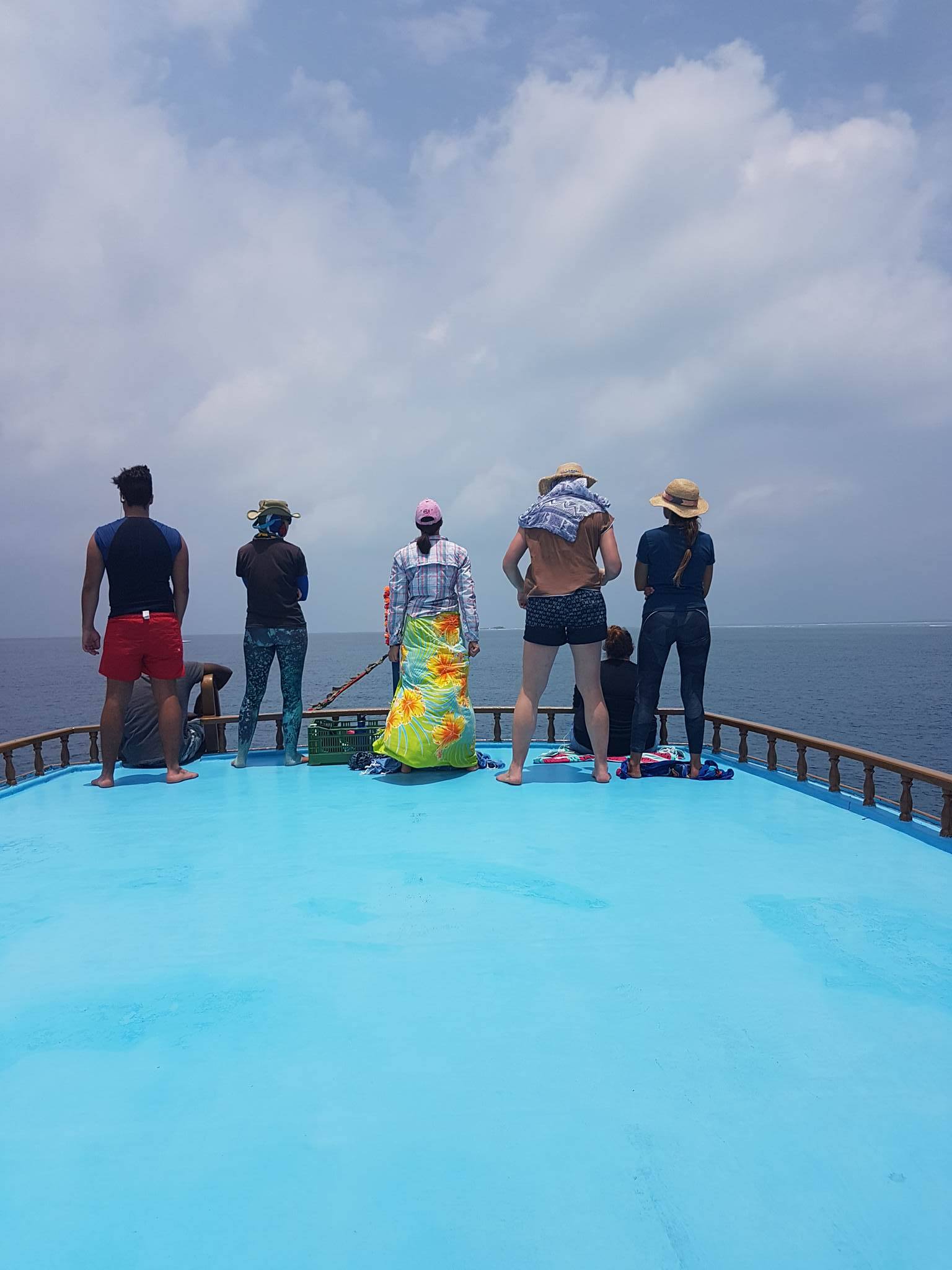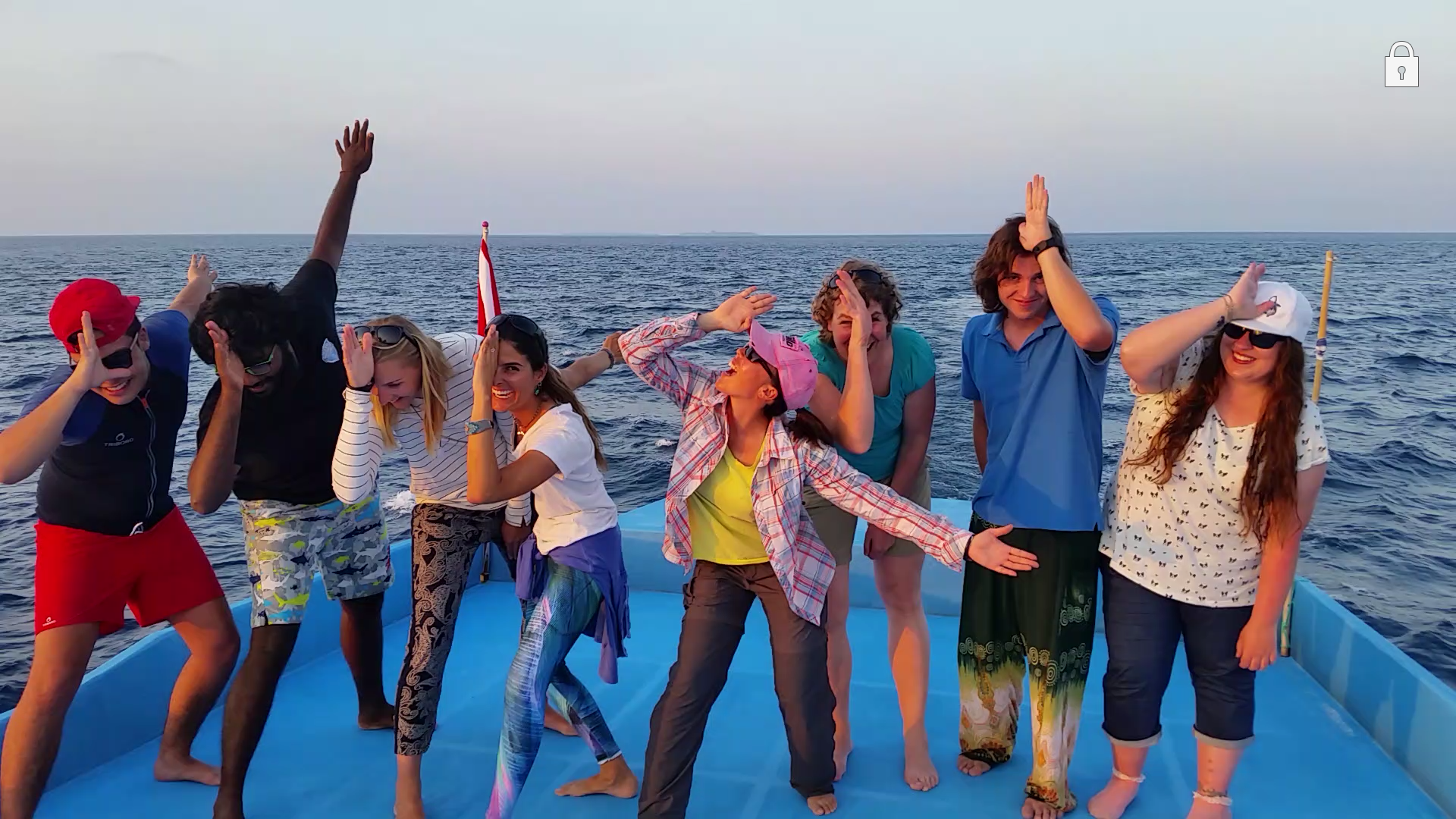How do strangers become a family?
As a world-traveling nomad, I’m constantly meeting new people and have come to appreciate that friends are the family you choose. But how do complete strangers become a family? In my short time with the Maldives Whale Shark Research Programme (MWSRP), I have gained valuable insights into that question. I have experienced how nervous introductions can develop into genuine caring for one another and how mutual curiosity about whale sharks can become a shared need to protect our greater inter-species family.
When I first arrived hot and sweaty to Dhigurah Island, I marvelled at how the only thing the MWSRP staff and volunteers seemed to have in common was an interest in whale sharks. We were 6 women and 3 men, speaking in various accents (Australian, French, Austrian, American, English, Scottish, Spanish, Mauritian, and Maldivian), spanning the ages of 19 to 40, and coming from different day jobs (student, DJ, funemployed, horse handler, scientist). But over the course of two weeks, we somehow managed to form a beautifully modern family! Here’s how:
- Share adrenaline-pumping, life-changing experiences: There is nothing more thrilling than hearing the pounding vibrations of half a dozen people stomping on the roof of the dhoni boat to alert the captain that a whale shark has been spotted. With fireman-esque energy (if not smoothness), we clamber down the ladder to don our rash-guards, spit unceremoniously into our masks, and slip into our fins. With the gracefulness of a whale shark on land, we plunk down into the water as the first mate quietly yells “Go, go, go, go…GO NOW!” The first moment you spot a whale shark gliding through the water, your heart skips a beat, and sharing that experience with others bonds you forever.

- Explore nature together: we spend 8 hours a day on the gorgeous turquoise waters of the South Ari Atoll, looking for whale sharks and “megafauna” (e.g., manta rays, spotted eagle rays, hawksbill and green sea turtles, dolphins, and even whales!). We also frequently spot less glamorous megafauna like “trashbill turtles,” “rubbish rays,” “bottle cap dolphins,” and “Styrofoam box fish.” On a more serious note, it is appalling how much human trash ends up in the ocean, polluting the otherwise crystalline waters
- Fight for a cause together: The third whale shark we spotted, Joey, had a seriously mangled dorsal and caudal fin from a failed finning hack job. He was also covered in lacerations, dents, and serrations from other human activity. We were all overcome by indignation and feel driven to protect these majestic and docile sharks. I have no doubt that we will continue to spread whale shark conservation back in our hometowns.
- Hang out when not required: When not in the water, we eat together, dive together, play volleyball together, and enter data together…trudging through the less sexy jobs can also be very bonding. I’ve gotten to know our team so well, I can recognise each person by their fins, food selections, and dance moves. It’s like identifying whale sharks by their unique spot patterns!
- Motivate and support each other: every family knows how to get each other psyched. A little competition never hurts! We motivate sightings with rewards of Magnum ice cream bars. As the afternoon wears on, the stakes increase to include free accommodation, meals, and exciting daytime/nighttime activities in each of our hometowns. (Who doesn’t want to ride horses in Melbourne or go surfing in Hawaii?!) We also keep track of points scored for spotting megafauna: e.g., 100 for a whale shark, 2 for a turtle, and 500 for a rare whale! On land, we play physically aggressive games of “Whale Shark” Uno that involve racing around the pool table to avoid drawing four.

- Develop a distinctive group identity through:
- Rituals: we collect data including environmental variables. At first, dropping a tennis ball into the ocean to measure the current felt bizarre, but within a couple of go’s at it, I had taken on measurements with Lord of the Flies fervour. We also choreographed a team dance move, aptly named “shark dab,” and it’s amazing how you can add the words “whale shark” into every song.
- Code names: We developed secret code names for each other like Magnum Hunter, Zumba, Spinner, and Bikini.
- Inside jokes: Well, you had to be there…#yolo #3words #FCM #applepower #focusharder

- Support each other in growing and learning: I’ve learned so much in the last two weeks from my team: science, DJ tips, horse training, travel tips, personal preferences for super powers, and everybody’s hopes, dreams, and challenges. For my part, I feel grateful for being able to teach yoga, retirement panning, and Burning Man preparation.
I’m sad to be leaving Dhigurah and my new family in a couple days, but I know this is just the beginning of our journey together. I have no doubt we will reunite somewhere in the world for more megafauna adventures. #menageanous

